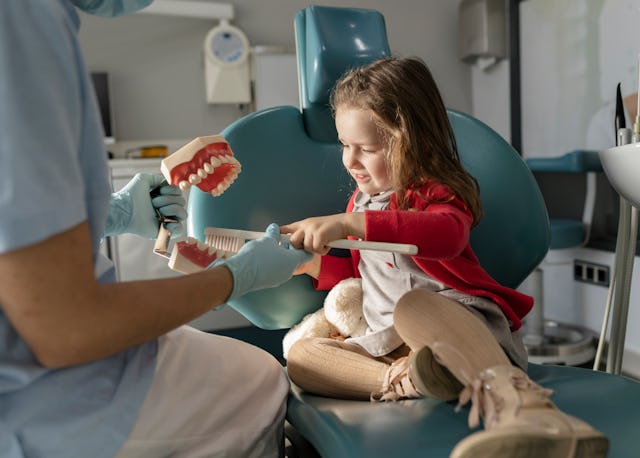A TikTok Dentist Claims Cavities Can Be Contagious. Here's What You Need To Know.
If cavities can be contagious, do we need to worry about swapping spit with our kids?

Tasneem Mahmood, DDS, blew a lot of minds when she posted a short TikTok video in March with a big claim: that cavities can be contagious. Not only did the post have over a million people wondering if they should stop swapping saliva with partners who have tooth decay — it also had parents wondering if they need to worry about “giving” cavities to their own kids.
It all started when the Houston dentist, who owns Progressive Dental, shared a video that says, “Thinking about the kiss I gave my husband even though he has cavities.” It’s captioned: “and that’s on cavities being contagious 🦠.”
The Guardian looked into the viral claim — and shed some light on the issue by talking with John Featherstone, a professor emeritus of the School of Dentistry at the University of California.
Featherstone said that yes, tooth decay can be transmissible. Certain strains of bacteria that are more likely to cause decay can be deposited in your mouth via kissing, and there have been cases of patients getting cavities after a lifetime without tooth decay because they started dating someone new who carried significant loads of certain bacteria.
“Be careful if your partner has lots and lots of decay,” Featherstone tells The Guardian. “They are going to transmit to you. So if your partner is loaded with active decay, do send them to a dentist and get it fixed.”
But Featherstone urges people to understand that even if you “get” someone else’s decay-happy bacteria in your mouth, you can combat it with eating a healthy diet, brushing, flossing, and regular trips to the dentist.
“Most of us have these decay-producing bacteria in our mouths,” he says. “I do. And I don’t have tooth decay. I haven’t had it for decades.”
‘Contagious’ cavities and kids
So, if adults can spread decay-causing bacteria through open-mouthed kissing, do parents need to worry about their kids “catching” cavities from others, in other ways?
Scary Mommy asked April Foster, a practicing pediatric dentist at Three Rivers Pediatric Dentistry in Missoula, Montana.
“I don’t know if I’d say cavities are contagious, but you can definitely transfer bacteria from one person’s mouth to another,” she said. “Most people aren’t kissing their kids on the mouth — but, yes, use a different spoon to feed your kid. And don’t use your mouth to clean your kid’s pacifier.”
Another good way to prevent your bacteria from having a field day in your kids’ mouths? Take care of your teeth and don’t let decay go untreated so that your bacteria population skyrockets, Foster says.
“If you have decay and it’s been treated, your bacteria levels will be less and you’re less likely to give it to your kiddo,” she explains.
Foster also says kids’ mouths are most susceptible to bacteria and decay when they have new teeth, so you should be more careful when they’re first teething and then again when their permanent teeth come in.
Still, she urges parents not to be too concerned about contagious cavities or certain strains of decay-causing bacteria.
“I wouldn’t say I’d be worried about catching cavities,” she says. “Somehow many kids end up getting this bacteria in their mouths, regardless of where they get it or how they get it.”
Like Featherstone, Foster stressed that you should care way more about cleaning your kids’ teeth than being paranoid about other people’s mouth bacteria.
“Taking care of the teeth, brushing the teeth, flossing, watching your diet,” she lists. “Those factors are way more important than worrying about getting the bacteria from someone. There are a lot of people who have the bacteria in their mouth but don’t have decay.”
This article was originally published on